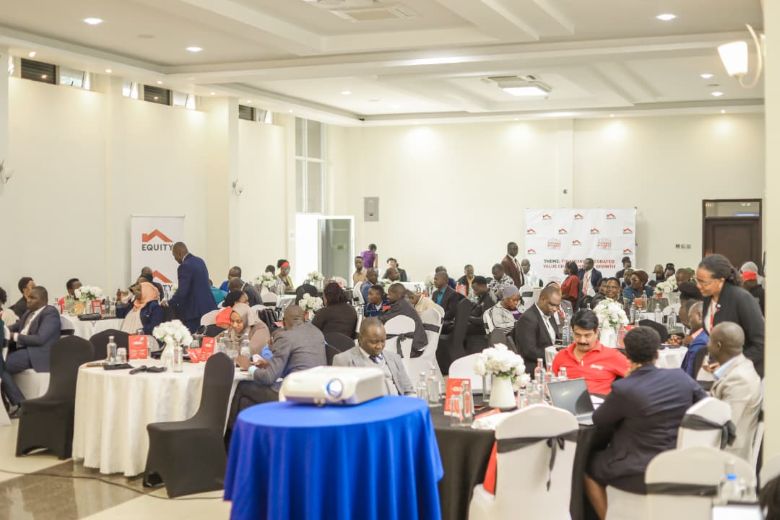Eight transformative lessons for SME success from Mbale TUPANGE Business ne Equity Bank forum

The TUPANGE Business Ne Equity Bank event in Mbale drew a vibrant mix of entrepreneurs, innovators, and community leaders to share ideas on unlocking the potential of Uganda’s small and medium enterprises (SMEs). With discussions anchored on value chain financing, digital transformation, and strategic partnerships, the gathering provided practical lessons for businesses striving to grow in an increasingly competitive market.
Speakers included Claver Serumaga, Executive Director–Commercial at Equity Bank, Ms. Olivia Mugaba, Head of SME at Equity Bank, Casa Uganda Safaris & Lodges Managing Director Saleh Naminya, Uganda Martyrs University lecturer Richard Odoki, and Natalisile James of MTA. Their messages reflected a blend of experience, research, and real-world examples, distilled into eight transformative lessons.
1. Scaling Beyond Survival
SMEs must aspire to move beyond subsistence operations. Speakers stressed that scaling requires not just capital but also technical support, skilled personnel, and compliance with institutions like URA and NSSF. Growth, they argued, is a deliberate process of building systems that can sustain larger operations.
2. Financing the Value Chain
One recurring theme was the importance of financing across the entire supply chain—from suppliers to distributors. Access to stock financing and mobile-based credit lines enables SMEs to take on larger contracts, maintain liquidity, and build credibility with partners.
3. Going Digital
The speakers urged SMEs to embrace digitalization, from mobile payments to point-of-sale technology, to tap into international markets and streamline operations. In today’s economy, they noted, clinging to outdated methods limits competitiveness.
4. Building Ecosystems Through Partnerships
Growth was presented as an ecosystem challenge: tourism businesses rely on agriculture and transport; manufacturers depend on reliable suppliers. Collaboration across sectors strengthens value chains and makes businesses more resilient.
5. Compliance as Opportunity
Tax compliance and formal registration were emphasized as gateways to government incentives, exemptions, and tenders. Entrepreneurs who maintain proper records and adhere to policy frameworks are better positioned to benefit from Uganda’s evolving business landscape.
6. Knowledge and Literacy as Capital
Knowledge, speakers reminded participants, is as critical as financial capital. Many SMEs falter because of poor decision-making, from hiring unqualified relatives to mismanaging credit. Equity Bank’s model of combining financing with advisory services was cited as a safeguard.
7. Sustainability and Market Access
Uganda’s SME failure rate—53%—was highlighted as a symptom of weak working capital and limited markets. Tailored solutions like invoice financing and trade fair participation can help SMEs expand beyond domestic constraints.
8. Proof Through Practice
The lessons were grounded in success stories. One SME supported by Equity Bank grew its credit line from UGX 20 million to UGX 100 million by consistently delivering for anchor clients like Coca-Cola. Such cases underscored how trust-based financing and performance can unlock exponential growth.
The event closed on an optimistic note: Uganda’s SMEs, long recognized as the backbone of the economy, can overcome structural barriers if they embrace digital tools, strengthen partnerships, and leverage financing models that extend across value chains. For the entrepreneurs in Mbale, the message was clear—sustainable growth is possible through collaboration, compliance, and innovation.


 Government reaffirms commitment to capitalise UDB as Bank deepens development finance role
Government reaffirms commitment to capitalise UDB as Bank deepens development finance role
 Uganda’s DEI Biopharma gene therapy breakthrough could transform sickle cell treatment
Uganda’s DEI Biopharma gene therapy breakthrough could transform sickle cell treatment
 Equity Bank Uganda set to close 2025 on firmer footing as clean-up phase gives way to growth
Equity Bank Uganda set to close 2025 on firmer footing as clean-up phase gives way to growth
 Stanbic targets wider access to affordable financing with ‘Oli In Charge’ campaign
Stanbic targets wider access to affordable financing with ‘Oli In Charge’ campaign
 USA–Canada certification dispute could expose Uganda and regional airlines to regulatory risk
USA–Canada certification dispute could expose Uganda and regional airlines to regulatory risk
 Sumsub launches AI Agent Verification as Africa grapples with surge in AI-driven fraud
Sumsub launches AI Agent Verification as Africa grapples with surge in AI-driven fraud